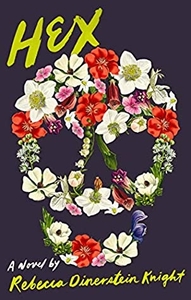Hex is a dark, uneasy novel about poison and desire. It follows the main character Nell, a PhD candidate in biological science, who’s expelled from Columbia after her labmate dies in an accident with plant toxins. Derailed, depressed and desperate, Nell steals the killer seeds to continue the work from a grim apartment in Red Hook. While she tries to engineer an antidote, she’s also writing a series of obsessive journals dedicated to ‘you’ – Dr. Joan Kallas, the lecturer she’s in love with.
Nell and Joan are caught up in not so much a love triangle as a love hexagon: there’s Nell’s medievalist ex-boyfriend Tom; her glamorous best friend Mishti; Mishti’s boyfriend Carlo; and Joan’s creepy husband Barry. Despite its botanical backdrop, the novel spends most of its time focusing on these tangled relationships, and the webs of desire between them are just about as toxic as the seeds germinating in Nell’s apartment.
If it sounds incestuous, claustrophobic and messy – it is. There’s a sense of ‘dark academia’ in Dinerstein Knight’s portrayal of campus politics. If you enjoy novels where everyone’s brainy and unpleasant (think The Secret History or Bunny) then this is one for you.
Nell herself is a compelling character to spend time with, not despite her unpleasantness but because of it. It’s always refreshing to read female characters who are allowed to be grotty. Not showering for days? Keeping a mushy banana in your pocket? Having toenail fungus? That’s feminism! Well, maybe not, but it makes for an interesting narrator. Nell’s world view is – for lack of a better word – weird. Her ‘journals’ are studded with surprising images, odd tangents, and strange yearnings: “I wished I could carve you a pumpkin”; “I wanted immediately, with my whole self, to be your cat”; “I thought it might be pleasant to be one layer of uncolored nail polish lying in rest over your fingernails”. I loved this depiction of desire – at once so unique and yet completely familiar.
The novel interrogates the idea of desire throughout. What do the characters want for themselves? For each other? From each other? Nell doesn’t always know what she wants, but she is always wanting, so that the act of wanting almost becomes an activity in its own right. After all, what’s more important to her: Joan, or the act of wanting Joan? As Nell wonders aloud to Mishti, “Which is fuller, the longing or the union?” Whatever the answer is for Nell personally, it’s certainly the longing that makes this novel a success.

